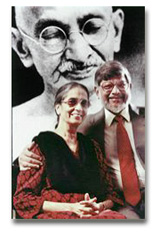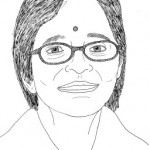
Spontaneity was always the hallmark of my life with Sunanda who died on February 21, 2007, just months short of our 50th wedding anniver-sary. We did not believe in planning. We simply saw a situation and plunged into it.
I fell in love with her at first sight in a hospital in Mumbai where she was nursing me after an appendectomy. We got married in a middle school hall and spent the first night in a class room because I did not have money to go to a hotel. Our honeymoon was a pilgrimage with my mother and half a dozen relatives escorting us to all the Gandhi monuments to pay our respects to my ancestors.
For the first year and a half we lived like nomads – renting an apartment for three months at a time. For the first ten years we struggled through economic difficulties and joked about the first week of the month being “paper week”, the second “silver week”, the third “copper week” and the fourth “pauper week.” It meant that in the first week we flaunted paper money, the second silver coins, the third week copper coins and the fourth we had nothing. It taught us the value of being together, loving each other, working as partners and nurturing compassion for others. In spite of our woes we looked at those below us to give a helping hand.
Over the years we rescued and found homes for more than 128 “unwanted” children – born to mothers out of wedlock. We worked for the poor in the city and in the villages and devised programs based on self-help rather than hand-outs. But the incident that opened my eyes to the devastating effects of poverty was when a little malnourished child, around five years old, tugged at my trouser leg in a suburban train in Mumbai. I was returning home from my work, it was just before the rush hour so the train was not overly crowded. The boy held a tin can full of home-made candy and was imploring me to buy some.
I was intrigued by the fact that anyone would send a little child out into the world, negotiating the horrendous big city traffic, hopping in and out of suburban trains without a ticket and being smart enough to avoid railway officials and the police. I asked him to get off with me at my station and talked to him about his life.
He was the youngest of four children and they lived in the slum made famous by the Bollywood movie “Slum-dog Millionaire”. His mother made candies every evening and sent him out with a full can every morning to sell them and bring the money home. The injunction was simple – No money, no food. Everyone in that family had to earn their bread. This young boy still had half a can full of candy and had not eaten much since he left home in the morning. When he was very hungry he spent time scrounging in the garbage for something that would assuage his hunger.
I helped him out that day but the memory of this young boy has remained embedded in my heart and mind ever since. I know there are hundreds of millions like him around the world and many million even in India which boasts of a booming economy and a phenomenal growth of billionaires. But half of the 1.2 billion people still live on less than a dollar a day and are so inexorably trapped in the vortex of poverty that they have no escape.
I realized there is just so much one can do and that Sunanda and I were already doing much to make a difference. But I could not erase the memory of this child. Fate brought Sunanda and me to the United States in 1987 and although we had all the opportunities to put the miserable memories of poverty and destitution behind us, we just could not do it. Then, suddenly in 2007 Sunanda died and it seemed like I was just one half of myself. I felt lost and abandoned with little desire to live.
When my friends in the United States heard of the tragedy in my life they all wanted in some way to show their love for Sunanda. Spontaneously, I said, just send me whatever cash you would like to give and I will find a way to help the poor children of India. In less than two weeks I had more than $40,000.
My daughter Archana, son Tushar and I decided why not enlarge the scope of this spontaneous idea and see where we go from here. This gave rise to the Gandhi Worldwide Education Institute with the mission to help children break the cycle of poverty through education.
We studied many models and realized that picking a child from an impoverished home and giving that child education will not help the family. In 9 cases out of 10 that one fortunate child becomes so ashamed of the poverty the family lives in that they break away and start life for themselves in a city. Rescuing one child only breaks up the family. To avoid this we have developed a program based on Gandhi’s concept of “Basic Education” which will attempt to lift the whole family out of poverty with a combination of academic and vocational training and sustainable employment for the parents.
Over the years I had come in touch with Ms. Anuradha Bhonsle, a compassionate social worker in the town of Kolhapur, a few hundred miles south of Mumbai in western India. She has spent more than a decade rescuing exploited children and trying to rehabilitate the families. She had little financial support and yet has been working doggedly to bring solace to as many families as she can.
Impressed by her dedication and commitment we decided to collaborate with her instead of inventing another wheel. Elsewhere in this issue you will read of the progress this project has made and what others feel about the idea.
What started out as being a modest memorial to my deceased wife has grown so enormous that my spontaneous feeling is that this whole campus be dedicated to the deceased members of the Gandhi family and each facility be named after an individual. I am inclined to call the center we are about to build in a village near Kolhapur – The Gandhi Center of Kolhapur –- but, of course, the Board knows nothing about this. Just one of my spontaneous ideas which will now go up to the Board for their decision.
I find spontaneity makes life more exciting!!







I was very interrested in the solution you found to help the families, yes, that’s true education of one child in the family doesn’t help for a long time, the child leaves and everything goes on… Thank you so much to share your experience !
Arunji
Was a very inspiring and moving tribute to your beloved wife!Shows you how much one can do even within one’s limitations when love is there to inspire and compassion to motivate.
I myself left US a few years ago,in fact that was where we had met!I am in India now to find out for myself if I have the capacity to make difference to at least one life here.The only difference is that I do not have the inspiration that you have-in the form of a loving partner who is still very much with you in spirit!